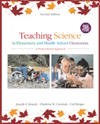 |  Teaching Children Science: A Project-Based Approach, 2/e Joe Krajcik,
University of Michigan - Ann Arbor
Charlene Czerniak,
University of Toledo
Carl Berger,
University of Michigan - Ann Arbor
What Is a Driving Question?
Web Links
Published Curriculum Resources
| GLOBE project
(http://www.globe.gov/)
This is the home page for Global Learning and Observations to Benefit the Environment (GLOBE). It is an international network of students, teachers, and scientists that conducts learning expeditions for students, holds teacher workshops, and publishes scientific reports. It has bilateral agreements between the U.S. government and dozens of other countries. |  |  |  | National Science Teachers Association
(http://www.nsta.org)
Teachers can go to the Web site for the NSTA to see lists of events relating to science teaching, find cross-links to relevant news stories, and order journals relating to science teaching. The site also has resources for students. |  |  |  | Eisenhower National Clearinghouse for Mathematics and Science Education
(http://www.enc.org)
This institution provides materials, lesson plans, and Web sites for science and mathematics teachers. |
Technology to Create Driving Questions; LeTUS
| http://wise.berkeley.edu/welcome.php
(http://wise.berkeley.edu/welcome.php)
This is the home page for the Web-based Inquiry Science Environment (WISE). Students can use this free site to explore controversies in science. |  |  |  | http://www.covis.nwu.edu/
(http://www.covis.nwu.edu/)
This is the site for CoVis: Learning through Collaborative Visualization, a community of students, teachers, and researchers working together to improve science teaching. CoVis completed its work in 1998. Similar research is being continued by the Learning Sciences Program at Northwestern University. |  |  |  | Center for Learning Technologies in Urban Schools (LeTUS)
(http://www.letus.org)
This organization designs curricula for middle school science classes. These curricula include computer technology, and the organization provides training for teachers in using this technology. |  |  |  | Hi-Ce
(http://www.hi-ce.org)
This is the home site for the Center for Highly Interactive Computing in Education. At this site students can download various software tools to investigate complex problems. Teachers can download software and curricula and can access information on professional development programs. |  |  |  | Science and Technology for Children
(http://www.carolina.com)
The Carolina Biological Supply Company supplies products as well as free software and audio and visual downloads for teachers. |
|



 2003 McGraw-Hill Higher Education
2003 McGraw-Hill Higher Education